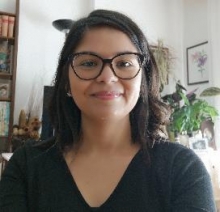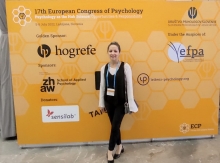Summary
Inclusiveness Target Countries (ITC) Conference Grants are a COST tool which helps Young Researchers from participating Inclusiveness Target Countries and Near Neighbour Countries attend international science and technology related conferences that are not organised by a COST Action. The Action aims at supporting their participation at relevant conferences, related to the research area of EurofamNet.
The COST Action CA18123 has five working groups. Conferences for which the grant is provided can contribute to the specific related tasks of the working groups, particularly tasks related to WG 2, 3, and 4.
Potential applicants that are interested to submit an application should read the ITC Grants guidelines for more details about eligibility, criteria for evaluation, financial support, criteria for reimbursement and how to apply.
Information for ITC grants guidelines: ![]() ca18123_itcgrants_guidelines_vs32022.pdf
ca18123_itcgrants_guidelines_vs32022.pdf
Further details can be consulted at the COST Annotated Rules: https://www.cost.eu/funding/how-to-get-funding/documents-guidelines/
Contact
ITC Grants Coordinator: Camellia Hancheva (hancheva@phls.uni-sofia.bg)
This Call is CLOSED
This Call is CLOSED
This Call is CLOSED
This Call is CLOSED
This Call is CLOSED
This Call is CLOSED
This Call is CLOSED
This Call is CLOSED
This Call is CLOSED

Parental Burnout and COVID-19 Pandemic: How Portuguese Parents Experienced Lockdown Measures
Name and surname: Joyce Aguiar
Home institution: Centre for Psychology at University of Porto
Field of research interest: Parental burnout
Name of the conference/congress: 2nd International Conference on Parental Burnout
Organizers: Université Catholique de Louvain
Website: https://www.burnoutparental.com/second-international-conference
A quote: The 2nd ICPB was a very dynamic and vibrant conference, as an excellent opportunity to network and find common ground to do collaborations.
The presentation: COVID-19 pandemic has brought additional stress to families and can be particularly difficult for parents suffering from parental burnout (PB), a condition that involves four dimensions: an overwhelming sense of Exhaustion; Emotional distancing from the child; Saturation or a loss of fulfillment with the parental role; and a sharp Contrast between how parents used to be and how they see themselves now. The current study aims to analyze PB and establish a comparison between the times before and during the pandemic. To pursue this aim, a quasi-longitudinal research design was adopted, by comparing two cross-sectional studies among Portuguese parents (N = 995), with a 2-year interval between each collection. Participants were surveyed voluntarily through an online questionnaire. Multivariate analysis of covariance was carried out, which revealed that parents had overall higher PB scores during the pandemic than before. There was an increase in exhaustion, emotional distancing, and contrast, but a decrease saturation. Although PB levels remain higher for mothers at both waves, the growth was greater for fathers than for mothers. The findings suggest that reconciling child care with paid work is a stressful and new experience for many Portuguese fathers. Notwithstanding, even amid a crisis, some parents had the opportunity to deeply bond with their children. We expect this work to encourage stakeholders to consider proper intervention strategies to address PB as a long-term consequence of this particular health crisis. Also, initiatives that enhance gender equity within parenting context are needed. Keywords: COVID-19, family stress, gender issues, parental burnout, parenting, Portugal

EUROFAMNET: setting an example of successful dissemination of research and knowledge on family in Europe
Name and surname: Branko Bošković
Home institution: University of Donja Gorica
Field of research interest: Sociology, Political Sciences
Name of the conference/congress: EUROFAMNET: setting an example of successful dissemination of research and knowledge on family in Europe
Organizers: World Education Research Association (WERA)
Website: http://www.wera-compostela.com
A quote: It was an online conference and it was an opportunity to present EurofamNet, what it is about, what its achievements are but most importantly, about how dissemination was implemented, which content, where and how.
The presentation: Research on family is gaining importance since pandemic caused by the COVID-19 has begun, since there are signs of virus’s negative influence in manifold aspects. However, the research on family will need to include pre-COVID-19 situation as well as the current moment so there is an estimation of what the following period will bring. The paper aims at presenting dissemination strategy and dissemination achievements of the European Family Support Network (EurofamNet). It is a COST Action focused on research of the family in Europe by creating collaborative pathways between researchers, practitioners, policy makers, families and children. The network is looking at ways of translating theoretical knowledge to the lay people, through using available dissemination and research channels. It aims at filling the gap between what we know and what we do, by creating innovative approaches to family research. The network created novel ways of science communication, using online tools as well as specific COST Action tools, as an effective way of improving and disseminating research results. The paper will research the success EurofamNet approach and ways how science is created, communicated and disseminated. The overall effect of this approach is to communicate research to different social actors and especially to families and children. Dissemination of the relevant data will increase visibility of the issues that families face and offer solutions for their successful overcoming. The paper will show how practical matters are presented in the network and how they are communicated with the wider audience.

ISPCAN Milan2021 Virtual Congress
Name and surname: Rita Pinto
Home institution: Faculty of Psychology and Education Sciences at the University of Porto
Field of research interest: Implementation and Sustainability of Evidence-Based Parenting Programs in the Community
Name of the conference/congress: ISPCAN Milan2021 Virtual Congress
Organizers: ISPCAN along with country partners, CISMAI and Università degli Studi di Milano-Bicocca
Website: https://www.ispcan.org/milan2021/?v=402f03a963ba
A quote: The ISPCAN Congress allowed me to deepen my knowledge of the research and intervention devoted to the protection of children’s rights, particularly in a changing Europe, highlighting the best practices to work collaboratively.
The presentation: During the ISPCAN Milan 2021 Congress, I had the opportunity to present my research. This presentation was in poster format. As the conference was online due to the Covid-19 pandemic, the poster was accompanied by a video presenting its content, in order to make the poster interactive and appealing. The presentation described the research protocol of one of my Ph.D. studies and was titled “The families' trajectories in the Child Welfare System: Evaluating the influence of an evidence-based parenting program”. The research presented is innovative and its outcomes will contribute to assessing possible improvements along the family trajectory in the Child Welfare System, identifying which characteristics of the program’s implementation are associated with favorable trajectories, and analyzing to what extent an evidence-based program can be a resource to promote family preservation.

17th European Congress of Psychology
Name and surname: Burcu Kömürcü Akik
Home institution: Ankara University
Field of research interest: Peripartumal psychology, bonding, parenting, family support
Name of the conference/congress: 17th European Congress of Psychology
Organizers: CANKARJEV DOM, Cultural and Congress Centre, European Federation of Psychologists’ Associations & Slovenian Psychologists’ Association
Website: https://www.ecp2022.eu/
A quote: The ICT grant served to me as a great opportunity on presentation skills achievement as well as on meeting eminent colleagues in the same field, creating networks and future collaborations!
The presentation: Studies have examined the role of perinatal post-traumatic stress disorder (P-PTSD) and psychological resilience in the quality of the mother-infant bond. The contact between mother and baby has also important role to improve motherinfant bond. 206 mothers of preterm babies and 446 mothers of full-term babies (age of babies ranges between 1-18 months) recruited to the study between March 2018 and April 2019. The Parental Bonding Instrument, Perinatal PTSD QuestionnaireII, Mother Infant Contact Barriers Scale, Connor-Davidson Resilience Scale, and Maternal Attachment Inventory were administered. Path analyses showed that parental attachment was positively associated with psychological resilience, negatively associated with mother infant contact barriers and P-PTSD and psychological resilience was associated positively with maternal bonding. Mother infant contact barriers and maternal bonding was negatively associated in full-term group whereas no significant association in preterm group and P-PTSD and maternal bonding was associated positively in preterm group whereas no significant association in full-term group. Mediation analysis demonstrated that psychological resilience significantly mediated the relationship between parental attachment and maternal bonding. For preterm group, P-PTSD had a mediator role whereas mother infant contact barriers did not and for full-term group, mother infant contact barriers had a mediator role whereas P-PTSD did not in this relationship. Multiple-group path analysis showed that the relationship between psychological resilience and maternal bonding was significantly stronger in preterm group, and the relationship between mother infant contact barriers and maternal bonding was significantly stronger in full-term group. Our results suggest that it is important to provide qualified maternal attachment to own mother, to actualize mother-baby contact from the first moments as possible, to define and lessen P-PTSD symptoms and to enhance psychological resilience of mothers for improving the mother-infant bond.

International Family Therapy Association (IFTA) 2021 World Family Congress
Name and surname: Ana Catarina Canário
Home institution: Faculty of Psychology and Education Sciences of the University of Porto
Field of research interest: Parenting interventions
Name of the conference/congress: International Family Therapy Association (IFTA) 2021 World Family Congress
Organizers: The congress is organized by the International Family Therapy Association
Website: https://www.ifta-congress.org/
A quote: The experience of attending the International Family Therapy Association 2021 World Family Congress in a virtual format was very positive. Having the opportunity to see the different presentations and know about various research and practices from all over the world contributed to increasing my knowledge and interest in the field of family support. Overall, I believe the congress set the opportunity to contact other professionals and researchers, contributing to a continued exchange of knowledge and ideas that support the health and well-being of families.
The presentation: The International Family Therapy Association 2021 World Family Congress was held online due to the COVID-19 pandemic. In its first edition in a virtual format, the congress platform was prepared to have the papers presented at the conference for a three months period, allowing the participants to attend all the pre-recorded presentations from March 26 to June 24, 2021. The conference focused on exploring new and familiar ways to assist families in overcoming their difficulties and challenges and alleviating their pain and suffering. In line with the scope of the 2021 congress, the presentation made described a case study on the digital delivery of Group Lifestyle Triple P (GLTP), a parent group program designed to be delivered in a hybrid format (in-person and through telephone), during the COVID-19 pandemic in Portugal. The presentation “A case study on the digital delivery of Group Lifestyle Triple P” was pre-recorded and is available at the congress platform from March 26 and until June 24, 2021. The purpose of the presented study was to explore the delivery of the GLTP parent group program through digital practice. Eight mothers of obese children aged 6–11 were recruited from a university hospital. Using a mixed-methods approach, the study sought to characterize the perceived changes throughout the intervention and explore the outcome measures on children’s BMI z-score, weight-related behavior problems, parents’ self-efficacy, interparental conflict, and parenting styles assessed before and after the intervention. Participants identified changes in themselves, positive parenting, and their ability to manage children’s nutrition and physical activity, contributing to improving children’s lifestyle behaviors. The clinical results were similar to those of studies in which the program was delivered in-person. Delivering GLTP through digital practice seems to be a possible way of implementing the intervention, particularly during the COVID-19 pandemic. Further information on the study can be found in the original manuscript published in the Journal of Family Therapy with the reference: Canário, C., Abreu-Lima, I., Santos, S., Silva-Martins, M., Campos, J., Enes Rodrigues, C., Tavares, M., Mansilha, H., Torres, S., Serra Lemos, M., & Cruz, O. (2021). Delivering Group Lifestyle Triple P through digital practice: A case study with Portuguese parents. Journal of Family Therapy, 43(2), 232-255. https://doi.org/10.1111/1467-6427.12334

ISPCAN International Congress, Milan 2021
Name and surname: Koraljka Modić Stanke
Home institution: Social Work Study Centre, Faculty of Law, University of Zagreb
Field of research interest: Adoption, family support, evidence-based programs
Name of the conference/congress: 16th ISPCAN European Congress on child abuse and neglect / ISPCAN Milan 2021
Organizers: ISPCAN with Italian country partners, CISMAI and Università degli Studi di Milano-Bicocca
Website: https://www.ispcan.org/milan2021/?v=402f03a963ba
A quote: It was a huge and carefully organized congress with many interesting topics; I was honored to represent EurofamNet there and was very happy to see several other members also participating :-)
The presentation: The Centre for Parenting Support ‘Growing up Together’ (‘Rastimo zajedno’), in partnership with UNICEF, develops accessible, evidence-informed and sustainable universal, targeted and indicated group-based parenting support programmes and supports the network of professionals who implement them in family centres, kindergartens and NGO’s throughout Croatia. Besides programmes Growing up Together for parents of young children (Pećnik & Starc, 2010) and Growing up Together Plus for parents of pre-school children with disabilities (Pećnik et al., 2014), the Centre has developed a programme for vulnerable parents in adverse parenting circumstances, entitled Growing up Together – Count Us In! (Pećnik et al., 2019.) It consists of three components: a programme of 15 weekly, 90-minutes-long workshops with parents, aiming to enhance parents’ psychosocial resources for positive parenting, and a programme of workshops with their children (3-6 years old) that are run simoultaneously with the aim to support their wellbeing and resilience. Those workshops are followed by a 30-minutes session of joint parent-child play focused to strengthening parent-child secure attachment. Workshops are facilitated by psychologists and social workers with additional training. The main method to determine programme impact was a quantitative evaluation of data collected pre- and post- intervention with standardised questionnaires: Parenting Daily Hassles (Crnic& Greenberg, 1990); Parental self-efficacy (Kerestes et al., 2009); Parent’s reactions to child’s misbehaviour - attempted understanding and angry outbursts (Stattin et al., 2011); developmentally positive (reading, playing) and negative (shouting, hitting) interaction (Pecnik, 2014); Parental beliefs (Pecnik et al., 2011); The Strengths and Difficulties Questionnaire (Goodman, 1997) for child that has participated in programme of workshops for children. Results from 27 groups that participated in test implementation (N=148 parents who – completed the programme) reveal the expected changes in how parents feel and behave in parental role, including significant decrease in parenting stress (both in the number of stressors encountered in parental role, and the intensity of distress parents have experienced in coping with those stressors). After the program parents reported an increase in parental self-efficacy beliefs, and in positive, developmentally desirable interaction with the child as well as a decrease in frequency of shouting at and hitting the child.Through the course of the 15 workshops with vunerable preschool children, facilitators observed that children develop more positive self-concept, become aware of their capabilities, including the ability to understand own emotions and emotions of others. They are also more able to find sources of support in coping with difficult situations. After test implementation (in 2018 and 2019) this programme is proposed as a new early intervention service of the social welfare system with the intention to bridge the gap in provision of family support services for disadvantaged parents of young children at-risk or engaged with child protection system.The process of development, implementation and evaluation of the Growing Up Together- Count Us In programme will be discussed with respect to the quality standards for evidence-based family support programmes that were developed within the framework of the COST Action 8123: The European Family Support Network. A bottom-up, evidence-based and multidisciplinary approach (https://eurofamnet.eu/).

Episodic memory and episodic foresight in middle childhood: Effects of parental maltreatment and neglect
Name and surname: Sanmya Salomão
Home institution: University of Porto
Field of research interest: Psychology
Name of the conference/congress: Childhood and Time IX Conference on Childhood Studies
Organizers: Tampere University, the Tampere Centre for Childhood, Youth and Family Research PERLA, and the Finnish Society for Childhood Studies
Website: https://events.tuni.fi/childhood-2020
A quote: Attending the IX Conference Childhood and Time, organised by Tampere University, the Tampere Centre for Childhood, Youth and Family Research PERLA, and the Finnish Society for Childhood Studies was an important opportunity for sharing my project results in this preliminary phase and discussing with different researchers, aiming at new perspectives and contributions to my work.
The presentation: The presentation “Episodic memory and episodic foresight in middle childhood: Effects of parental maltreatment and neglect” aimed to explore the relationship between parental maltreatment and neglect (which usually led to coercive disciplinary practices, unpredictable parental reactions, and unstable family routines) and children´s time reasoning, including mental time travel abilities. Episodic memory and episodic foresight are two strongly related capacities involved in mental time travel, contributing to individual awareness of personal experiences and identity in time. Through mental time travel experiences, children develop integrated relations of past, present, and future events, enhancing a coherent sense of self through time. In the study presented, a detrimental effect of parental neglect on the development of episodic memory and episodic foresight was observed. In groups where children were exposed to higher levels of risk for parental maltreatment (severe neglect and exposure to domestic violence), their narratives included lower levels of episodic content. Effects on children’s ability to project themselves into the future were also observed. They tend to become more limited to present events and present difficulties in going beyond immediate constrains.

8th International Congress of Educational Sciences and Development
Name and surname: Ana Catarina Canário
Home institution: Faculty of Psychology and Education Science at the University of Porto
Name of the conference/congress: 8th International Congress of Educational Sciences and Development
Organizers: The Congress has four organizing institutions, two from Spain, Universidad de Granada (Grupo de Investigacion CTS-261), Universida de Vigo (Vicerrectorado de Pontevedra), and two from Portugal, Universidade do Minho (Instituto de Educação) and Universidad
Website: https://en.internationaleducationcongress.com/
A quote: This conference is aimed at academics and professionals from all fields of Education Sciences and Developmental Psychology. It is addressed to those working in the field of Family, School and/or Community Education and in the Psychology of Human Development at the practical and/or theoretical level. The conference is organized by four well-known universities in the fields of Education Sciences and Developmental Psychology from two European countries (Spain and Portugal). The conference contents will be delivered in three languages: Spanish, Portuguese, and English. International presentations will be made, allowing participants to share and discuss theoretical and practical knowledge. Given the Covid-19 pandemic, the conference will be held online.
The presentation: The presentation “Issues, perspectives and arguments regarding family and parenting support program evaluation strategies” addresses some of the contents of the work developed by WG3 members on task 3.5, identifying and compiling sound evaluation tools in family support area. The presentation is part of a symposium (Chair: Lucía Jiménez) with the title “Evidence -informed family education and support in contemporary Europe. Contributions from the European Family Support Network”.

8th INTERNATIONAL CONGRESS of EDUCATIONAL SCIENCES and DEVELOPMENT
Name and surname: Anita Burgund Isakov
Home institution: Faculty of Political Sciences (Belgrade)
Name of the conference/congress: 8th INTERNATIONAL CONGRESS of EDUCATIONAL SCIENCES and DEVELOPMENT
Organizers: INTERNATIONAL CONGRESS OF EDUCATIONAL SCIENCES AND DEVELOPMENT
Website: https://www.psicoaragon.es/eventos/8th-international-congress-educational-scienc…
A quote: During the Conference:” 8th INTERNATIONAL CONGRESS of EDUCATIONAL SCIENCES and DEVELOPMENT” I have attended symposium on the topic:” "EVIDENCE-INFORMED FAMILY EDUCATION AND SUPPORT IN CONTEMPORARY EUROPE. CONTRIBUTIONS FROM THE EUROPEAN FAMILY SUPPORT NETWORK" where I have presented the results of the research on systematic literature review on the family support workforce. I have worked together with professor Nevenka Žegarac, Cristina Nunes and Ana ANtunes on writing a paper about findings. The title of presentation was: Workforce skills used in family support: a systematic review” and I have presented the main idea, method, findings and conclusion of the paper. There has been a bit of the discussion on findings and possibilities for further in depth research on the topic and everything have been videotaped on ZOOM platform and presented on the Conference in schedualed time. In the symposium I have exchange my views and knowlages together with the rest of the members. Since the conference was filmed in advance there was no communication afterwords, and no questions about the symposium form other conference attendees.
The presentation: The topic of the conference and the content is very relevant to my work as a researcher and assistant professor at the Belgrade UNivesity, Faculty of Poalitical sciences, department of social policy and social work. I teach social work and it is very important for me to be up to date with the family support perspectives, domains and challenges in order to teach my students. Other important research topic occurred during the discussion on conference about possibility to research in depth some other literature such as books, reports and some of the grid relevant material about family support workforce since my previous research has established good fondations to further analyses of its family support workforce standards and qualities. After conference we have formed the team on establishing further research on workforce skills of family support in our WG4 team.

Is being a parent in Portugal satisfying? How gender, parental burnout and parental competence relate to life satisfaction
Name and surname: Marisa Matias
Home institution: Faculty of Psychology and Educational Sciences – University of Porto
Field of research interest: Gender and Family relationships; Work-family integration; Parenting and couple dynamics
Name of the conference/congress: 1st international conference on parental burnout
Organizers: Isabelle Roskam & Moira Mikolajczak, UCLouvain, Belgium
Website: https://uclouvain.be/fr/instituts-recherche/ipsy/1st-international-conference-on…
A quote: The environment of the conference was very welcoming allowing for fruitful discussions that went beyond the time slot for the presentations.
The presentation: Is being a parent in Portugal satisfying? How gender, parental burnout and parental competence relate to life satisfaction Abundant research has stressed that parents, across industrialized societies, compared to nonparents, show lower levels of well-being. This is commonly attributed to the fact that children increase adults’ exposure to a variety of stressors (e.g. demands of time and energy, work-family conflict, sleep deprivation) and thus the emotional rewards of having children may be out-weighed by the emotional and financial costs associated with contemporary parenthood. These strains may be heightened in contexts where minimal institutional support is provided, as it is the case of Portugal, and among women, who have the greater responsibility for child care in virtually all OECD countries. On the positive side, perceptions of parental competence have been found to relate positively with psychological well-being. Therefore, in this study the focus is on characterizing parenthood in Portugal analyzing the linkages among parental burnout, parental competence and life satisfaction, as an indicator of wellbeing, disentangling these linkages for mother and for fathers. Data was collected using online and paper and pencil self-report questionnaires. A convenience sample of 407 Portuguese individuals (n= 205 women) was gathered. Most of the sample is working (97% of men; 89% of women) has, in average, 1.7 children and is a two-parent family (88-89%). T-Tests and correlation analyses were performed to explore the linkages among the proposed constructs. Our results show that women have higher levels of parental burnout than men, in all the considered dimensions (exhaustion, contrast, being fed up and emotional distancing) and that women perceive themselves as less competent in the parental role than men. No gender differences were found in regard to life satisfaction. Parental burnout is linked with lower levels of life satisfaction and parental competence for both men and women, with the exception that men’s life satisfaction does not seem to be linked to men’s parental exhaustion. Life satisfaction is positively linked with parental competence for both men and women Overall our results grant additional evidence to the parental burnout construct and measurement and highlight gender specificities that can be interpreted in light of societal views on what is expected of mothers and fathers. Indeed, Portuguese mothers (as well as mothers in other societies) are more overloaded with the task of parenting and this is noticeable in our findings of less perception on parental competence and more parental burnout.